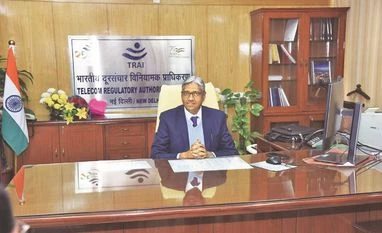Telecom operators can continue to provide their services until their existing licences expire, but can't opt out of the new service authorization regime brought in by the Telecom Regulatory Authority of India (Trai), the regulatory body’s Chairman Anil Kumar Lahoti said on Wednesday.
Addressing a press conference on the new regime, Lahoti said Trai has mandated no timeline for telcos to seek a new authorization, stressing that it is voluntary. “Telcos can continue to operate under the existing licence as long as the validity of their licence lasts. When the licence validity expires, they have no option. The renewal will have to be on the new authorisation regime,” he said.
In a major overhaul of the licensing ecosystem in the telecom sector, Trai had last week recommended that three new categories of authorisations be created to cover the gamut of telecom services in the country in line with the new Telecom Act, 2023. "There is no restriction on telcos. Our recommendation says telcos can shift to the new system the day they want,” Lahoti stressed.
But telecom service operators fear that replacing the current licence regime based on a “contractual agreement” with the government could threaten their investors and their investments by creating major “regulatory uncertainty” and lack of “predictability”. Strongly opposing the move — on which there is a broad unanimity among Reliance Jio, Bharti Airtel and Vodafone-Idea Ltd — some of the telcos have argued the new regime will “limit their contractual rights” and their right to challenge any specific terms and conditions introduced by the government.
In a meeting with Telecom Minister Jyotiraditya Scindia on Tuesday, telecom honchos had made it clear that the new authorizations should only provide for the broader aspects like application process, eligibility conditions, etc. while the detailed terms and conditions should continue to form part of the contract between the government and telecom service providers.
Explaining the adverse consequences of the move, a senior executive of a leading telco said: “By scrapping the need for a contract between two parties, which is the basis of all commercial relationships, it gives leeway to the Department of Telecommunication (DoT) to arbitrarily make amendments and change terms, and we cannot challenge it under the contracts Act anymore."
He also pointed out that investors, global or domestic, would be jittery as this would jeopardize regulatory stability. “At a time when many telcos are looking at global investors, this will only make them rethink,” added the executive.
Satellite spectrum
Lahoti said DoT is expected to shortly send the terms of reference for satellite spectrum allocation to Trai, after which the issue would be taken up on a high priority, and a consultation paper be released in the next few days. The consultation paper is set to clarify the methodology of allocation, the frequencies to be used, the pricing of spectrum, and the terms and conditions to be met by satellite operators with regard to national security.
Satcom players will have to seek a new “Satellite-based Telecommunication Service Authorisation” that has been proposed for commercial satellite services, merging the erstwhile VSAT-CUG service and GMPCS licences, which both Jio and Airtel satellite arms have already secured. Satellite-based telecom providers will also be permitted to make use of the satellite earth station gateways established in India for servicing foreign countries, after obtaining government permission.
On Trai leaving out communication over-the-top (OTT) services such as WhatsApp, Facebook Messenger, and Telegram from its service authorization recommendations, Lahoti said the matter might be discussed separately.
New Mandate
- Introduced ‘Unified Service Authorisation’ for all services nationwide to streamline licence ecosystem
- Will include mobile service, broadband, landlines, satcom, machine to machine (M2M) and internet of things (IoT)
- Authorised entities have been allowed to share all active and passive infrastructure amongst themselves
- Entry fee for different service authorisations has been reduced to drive fresh investments, boost competition
Unlock 30+ premium stories daily hand-picked by our editors, across devices on browser and app.
Pick your 5 favourite companies, get a daily email with all news updates on them.
Full access to our intuitive epaper - clip, save, share articles from any device; newspaper archives from 2006.
Preferential invites to Business Standard events.
Curated newsletters on markets, personal finance, policy & politics, start-ups, technology, and more.
)